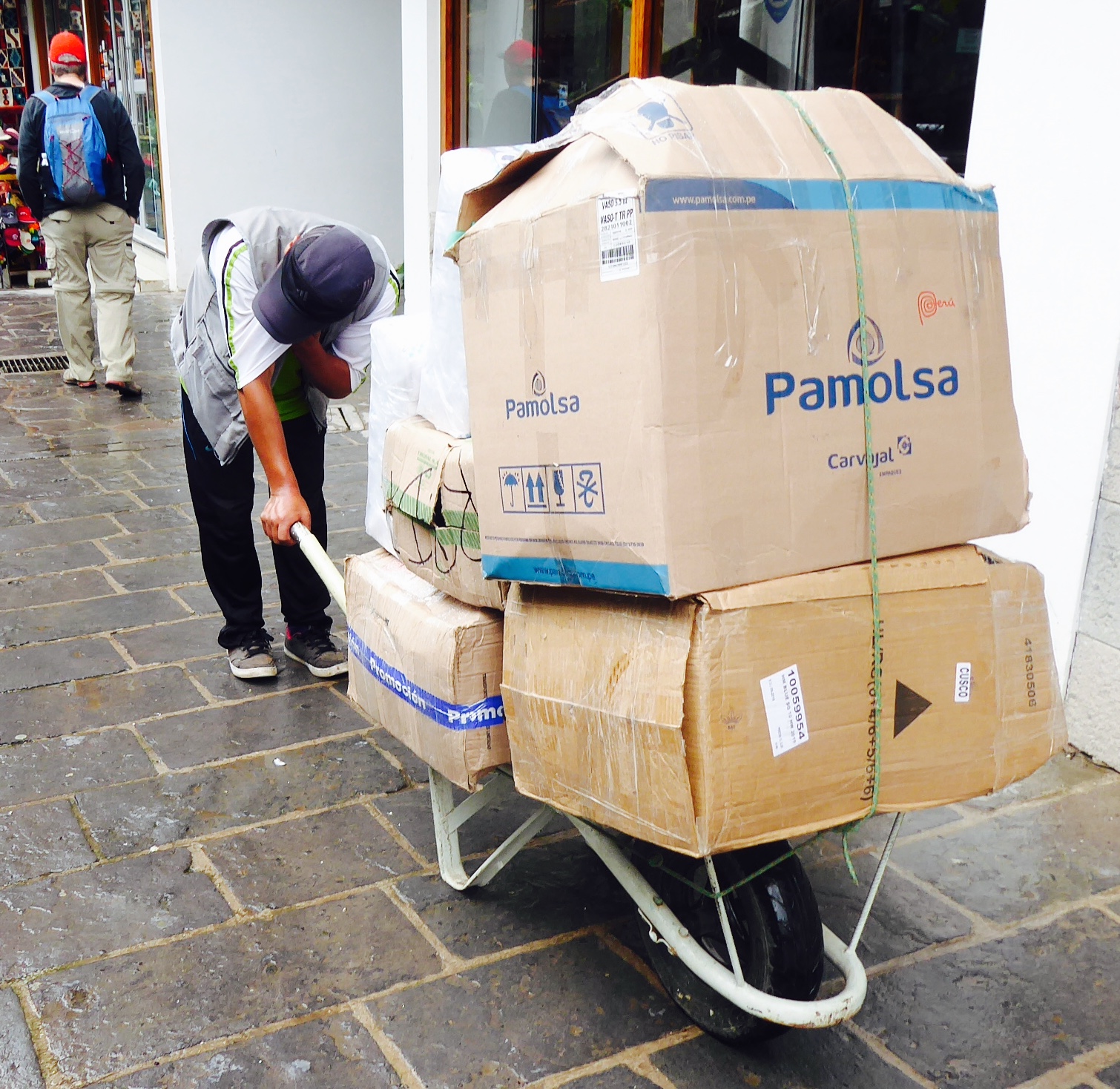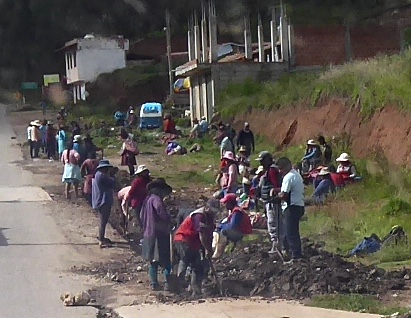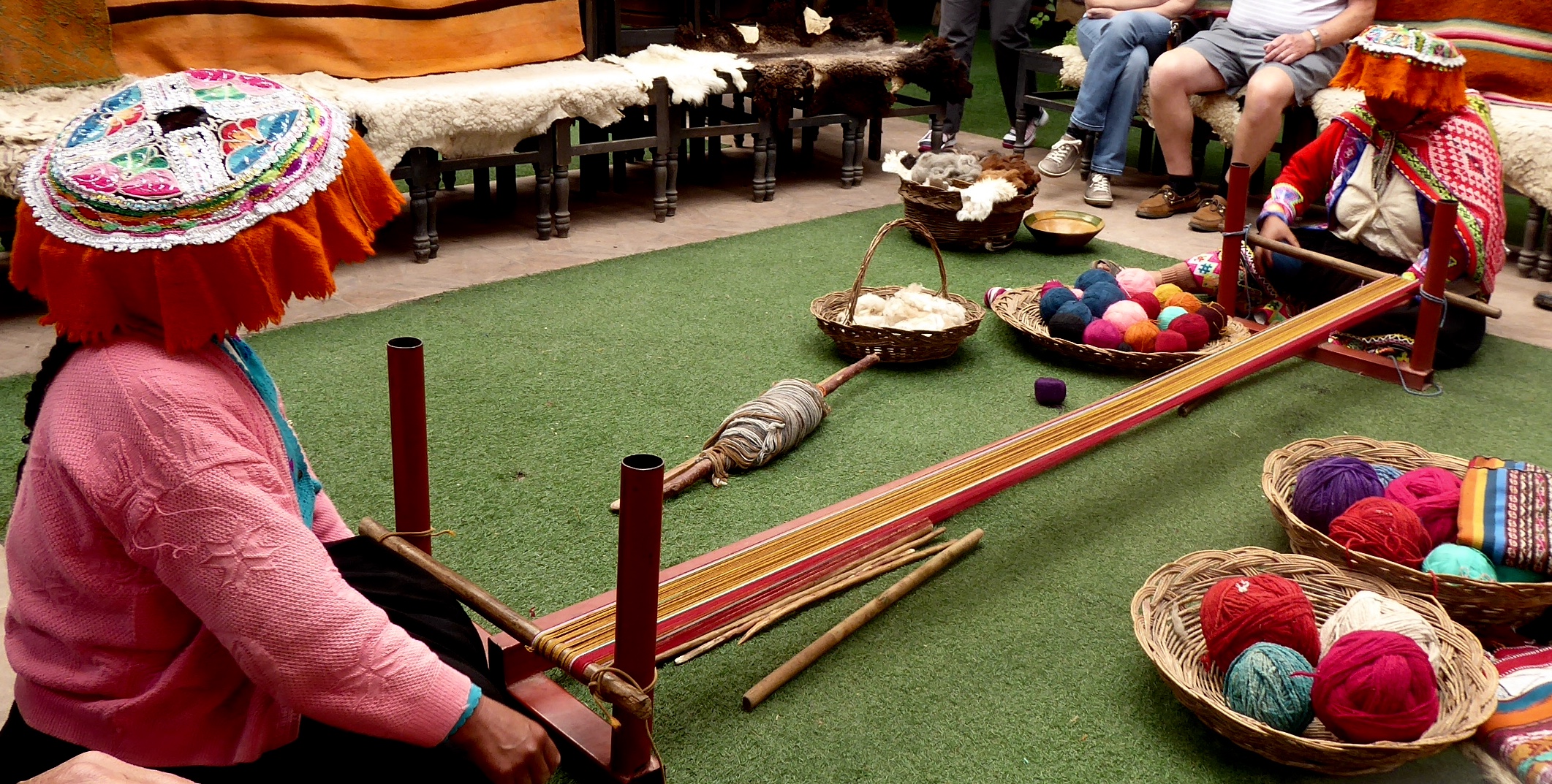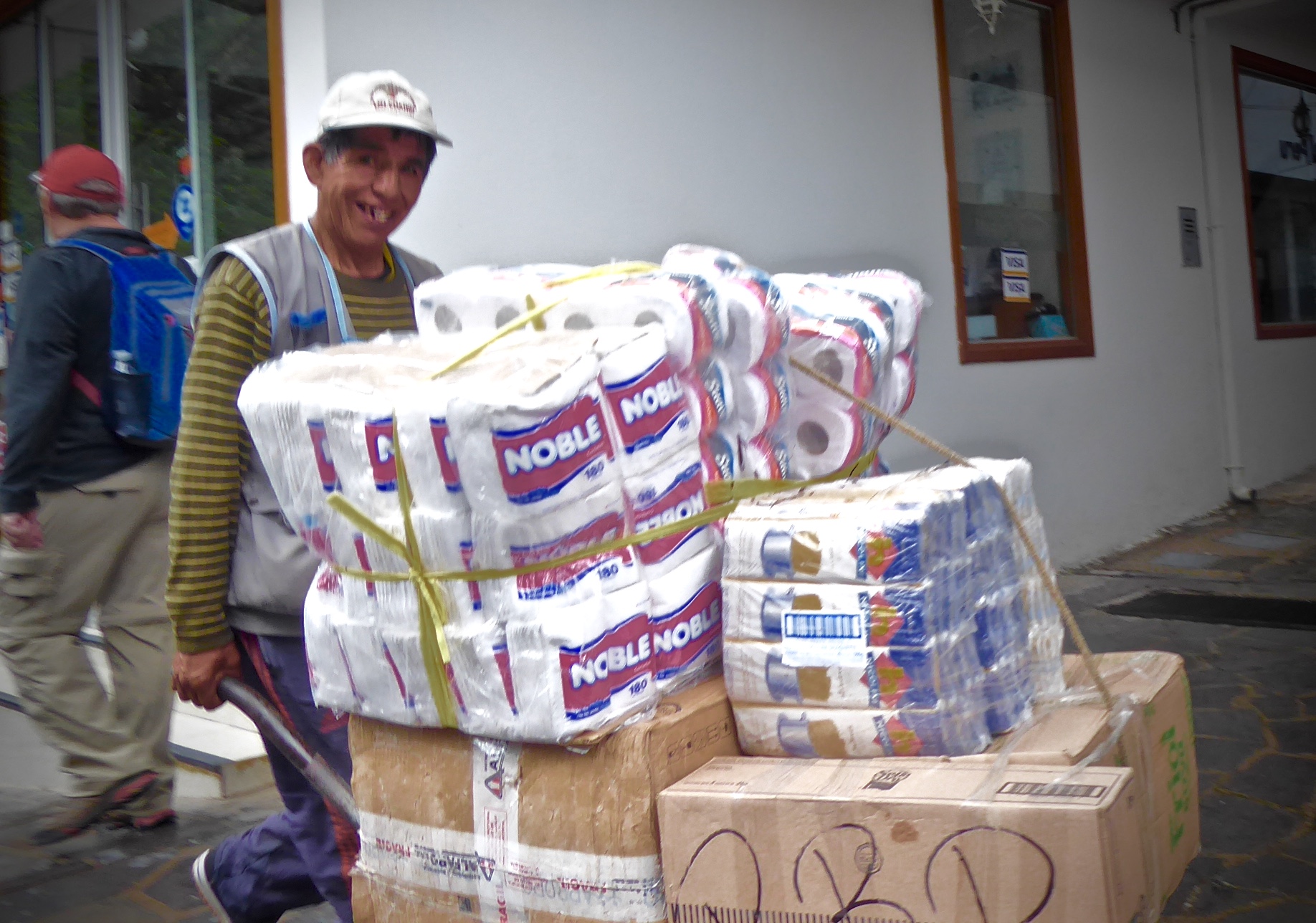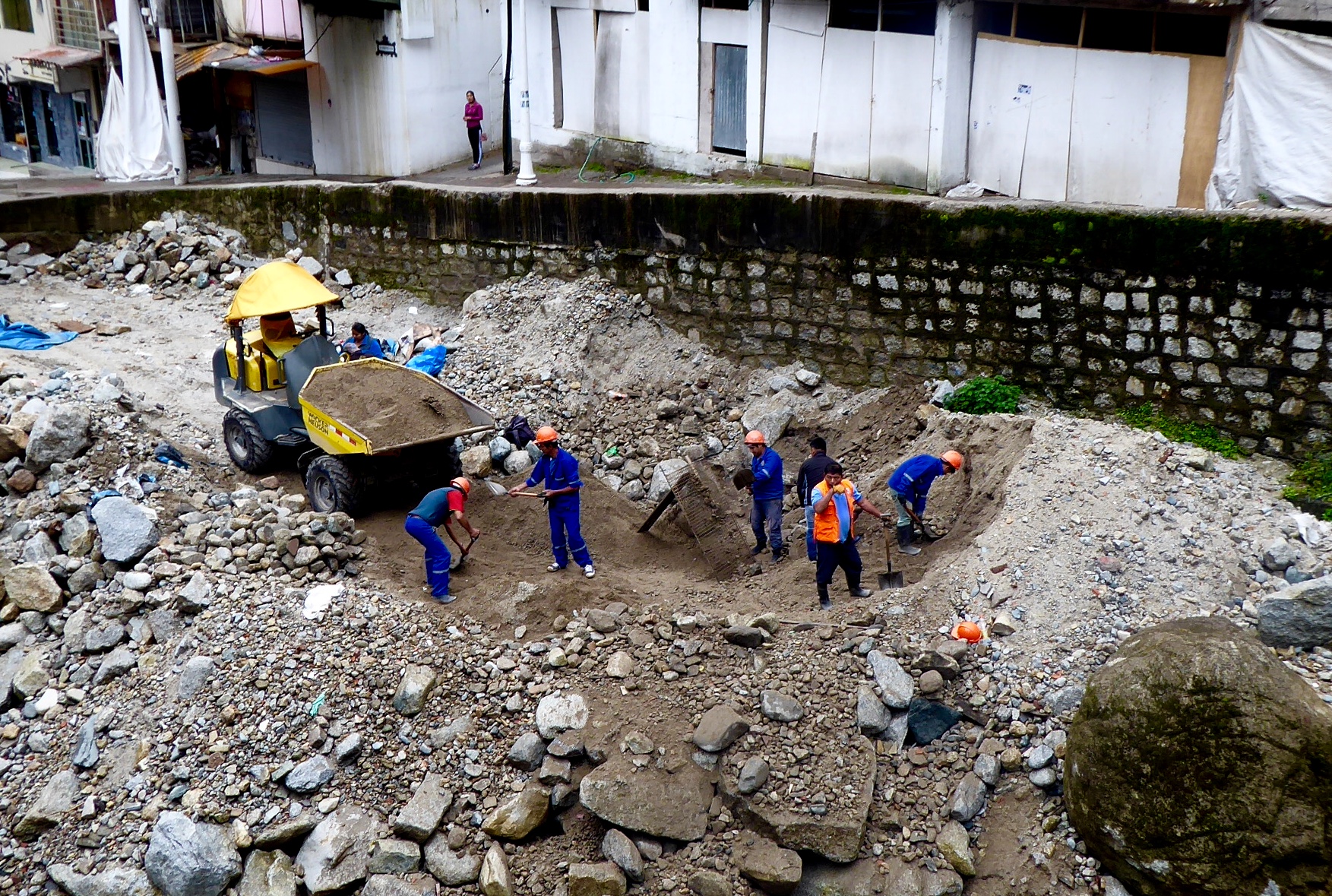South America: A Long Day, A Hard Life
A long day, a hard life.
A South American Adventure The introductory Post
Peru, A Different Perspective: Includes Slideshow
Peru and the Inca: Back to the Future Inca Agricultural Research
The Falkland Islands: Our Perceptions of the Islands.
This post seeks to compare everyday life in rural and small-town Peru to our lives in Canada. While I think people in Peru are generally happy with their lives (in terms of family, friends, and neighbours), life does look to be far more difficult than in Canada. It makes me wonder why, in Canada, we seem to complain about the least little thing when our standard of living and level of privilege appears to be considerably higher than in Peru.
1. To what extent does luck play a role in our lives?
A man about my age (late 70s), pushed what looked to be a backbreaking load along a street in Aguas Calientes (I), the last small town before Machu Picchu. He stopped and leaned over breathing hard. After resting a few moments, he straightened, stretched, and with gritty determination grabbed the handles of his wheelbarrow and continued.
As we passed, our eyes met, he nodded and we smiled. While he was obviously weary, the smile and sparkling eyes suggested a happy man. As he continued along his uphill path, I continued down taking more photos of life in small-town Peru. A few minutes later, I met another man pushing a similar barrow full of goods (photo in the footer), and he too wore a happy smile accented with sparkling eyes. We also exchanged smiles and passing nods. It looked to be a tough life for the two men their later years.
Later that day, while passing through another small town, a group of townspeople (photo taken from our bus as we drove through) was cleaning (or rebuilding) a drainage ditch. We are told by our guide that everyone in small towns sprinkled across rural Peru, have a standing obligation to help build, then keep public works systems clean and functioning. It looked to be a tough way to spend the weekend, but there is also the aspect of a community working together to make life better for everyone.
This photo shows only one part of a large group of people spread over two or three blocks on the edge of their village. They were working to build or repair a drainage system, an essential part of these high mountain communities (we were outside Cuzco at about 12,500 feet at the time).
The photo below, along with a slideshow) provides a glimpse of a group of women, ancestors of the Inca, who, with the help of a National Geographic grant, started a weaving business a few years back. They now have a thriving operation that caters to an increasing number of tourists passing through their village of Chinchero, a community of about 20,000 Quechua (catch ur ah) speakers, located on a 12,500-foot plateau a few miles northeast of Cuzco.
While they work exceptionally hard (by our standards at least), their efforts provide only a modest living for their families. A full outline of their business venture is described in a National Geographic article of some years back. Such is the working life for many ordinary men and women in Peru and other South American countries.
These women may work several weeks creating one table cloth or a day creating three or four little belts that are sold for $2.00 each.. They may sell one or two belts per day and a table runner every week or so. It may be weeks before they sell one of their intricately woven table cloths. Every part of the weaving process uses natural products of Peru including the dyes which are handmade on site. (Chinchero Cultural Centre)
WEAVERS SLIDESHOW
Think about this. If we were dealt different cards in life, we could be any one of these men or women, and they could be us. Whether we carry a heavy load in the third world, or we lay back watching a big screen TV in Canada (a smartphone tucked by our side) a good part of the reason we are where we are, is based on the luck of our birth.
We didn’t select our race, creed, colour, or country of birth. We could have ended up in our mother’s arms as she fled Syria in a rickety boat, or become a mineworker at the 18,000 foot level in the Andes. We might even be sitting in a giant office overlooking Wall Street counting our money. There are millions of places we might have been born and paths we might have followed other than the one we’re on.
While what we become after birth is related to how we apply ourselves, even that is subject to the conditions into which we were born, for, as we know, even in Canada many people have a number of strikes against them from day one. Based on these chance outcomes, does anyone have an inherent right, God-given if you wish, to think they are better than anyone else in the world? And, why is it we (in Canada at least) seem to complain about every little thing that does not go our way?
When we wake up in the morning in Canada, we should count the lucky stars that we were born here. And, because many of our advantages arrive by pure chance, you would think we might be more understanding of those who are different or who have not had it so good. Yet, each day on social media I observe people making or reposting derogatory comments that demean others because of some aspect of race, religion, colour, custom, orientation, or other defining feature that is, apparently, different from their own. Now, let’s go back to South America.
2. About these posts from South America
By this time, the third article of the series, you cannot have any expectation of this being an ordinary travelogue even though I will add slideshows, photos, and comments to back my observations.
While there is no question the countries we visited are a stunningly beautiful and filled with amazing, hard-working people, they are also countries, that, for various reasons (mostly political), the majority struggle to move forward. Even at that, they strive to achieve peace and prosperity for their families despite the ravages wrought upon them by colonial armies, religious institutions, illegal interventions, and deceptions of the past four hundred years. They are people like ourselves only they have not been gifted with the history of the freedom and prosperity we enjoy in Canada.
Three weeks provided scant time to gain an in-depth appreciation of the challenges, however, the addition of daily lectures, the reading of two short books and our tour brochures, along with the excellent narrative provided by knowledgeable, local guides, helped to fill some of the blanks. Also, the experience afforded by having visited other parts of the planet considered to be third world or emerging third-world economies helped in making comparisons and drawing conclusions I think to be reasonable. Now, to the matter of privilege (5) in Canada.
3. Canadians: privileged people:
As Canadians, we often have difficulty sorting out our “wants and needs”, a distinction that is increasingly blurred in the twenty-first century. As in many first world nations, we are spoiled, and this goes beyond anything we might attribute to a child who won’t stop whining because they can’t do or get what they want.
I’m not targetting children or young people (as many older people do), I’m looking across the spectrum of age. Many of us have become so accustomed to having almost everything we want; we think that is the norm. In many ways, we live in a world that is a ten-year bubble on calendar wheels that roll along day by day and month by month. In most instances, everything outside the bubble, past or future, is relatively unimportant in defining our daily mindset.
Do you remember not having indoor plumbing, running water, central heat, electricity, a fridge, perhaps no TV, smartphone, cable, or high-speed internet? For those who do remember, they are distant memories that have little effect today. The only time we might invoke those memories is to chide some younger person about not knowing how hard it was when we were young.
It’s tough for us to understand how life would be without our advantages, yet travel to other countries helps bring home the message in some small way. The hope is, that when people return from abroad, they will be more understanding and compassionate of the challenges faced by others both at home and abroad.
For some adults, it may be too late to late as they are far too comfortable in their particular bubble of privilege. I’m not suggesting we shed our privilege, as it comes in many forms, some of which is essential to the freedom we enjoy in our democracy. But, as I said, we are spoiled.
4. How we are spoiled?
Few people in Canada wake up wondering how they might get a second pair of shoes or a winter coat, let alone a first. Of course, we have people in Canada who live in desperate conditions, but they are not the norm as the majority enjoy what is one of the highest standards of living in the world.
A large number retire by age sixty-five, with many doing so a decade or more earlier as did yours truly. At home, we have a health care system that is second to none in the world and funded in a manner that ensures a large percentage of the less fortunate can also count on reasonable care. We pay a variety of fair taxes and have elected, democratic governments at the local, regional, provincial and national levels, yet we complain incessantly about those governments. In Canada, if we don’t like a political party or our elected member we just get a majority of people together and turf them out in the next election.
We have a Constitution and Charter of Rights that constrain the people we elect and our government agencies. It also outlines the rights of the people and, is administered by an independent judiciary following the rule of law (4). While the system may at times be cumbersome, it is there to protect everyone from abuse of power by governments, government agencies and others who might wish to see their particular place in society or brand of belief prevail. Importantly, it is a secular system (3) that cannot be whipsawed by differing religious beliefs.
Our public education, at all levels, is among the best in the world, and children are provided free (compulsory) access through the secondary level. For the well-heeled, there are private schools and universities catering specifically to their need for extra privilege. Oh, and we have something that’s not the norm in many parts of the world – property rights (title to our land). In Peru, land title is in the form of “squatters rights” (and that only came about in the 1970s), something I shall speak about in another post.
While many (perhaps most) of the above items are absent in many South American countries, I don’t sense the people are unhappy or depressed, as they seem to have a high degree of cohesiveness within their families and communities. They even seem to have retained an aspect of family and community that is increasingly diminished in our consumer-oriented society.
5. What does the future hold?
The natural and human resources Canada holds as a nation is second to none in the world and if we had become better at extracting value from our resources, Canada and the Provinces would have been debt free by the third or fourth quarter of the last century. In turn, we could have distributed those resources in a manner that would have largely extinguished poverty in our country and helped other countries along the path.
What stops us from achieving that goal today (and in the past) is greed, both individual and corporate. The more we get, the more we want (and the less we want to pay) as that is the path of our consumer society. I don’t sense this is as much a problem for ordinary citizens living in the third world as their wants and needs are more clearly defined. As for the governments and corporations that hold the reigns of power in many of these third world countries, it is most certainly a problem.
As for the first world, this vicious cycle of consumption and disregard for the well-being of Mother Earth will eventually lead to our downfall. Most countries in South America are also rich in natural resources, but a relatively small portion of that value ends up in the pockets of the people. It is an issue I shall speak to in future posts.
As for Mother Earth, they too are on a downward spiral as climate change and excessive demand, largely by corporations extracting the natural resources, is exacting a massive toll. Some of the best fishing grounds in the world off Peruvian coast have been nearly depleted and, across the Andes, glaciers are retreating at an astonishing rate.
Today, “The Ides of March” 2019, schools kids from around the world were marching to draw attention to climate change. Their message is clear – something must be done or the world they inherit may be damaged beyond repair. Do you suppose the selection of today’s date was just coincidental?
In upcoming posts, I shall explore the issue of climate change as well as the shackles that have held back large parts of South America from achieving goals that might well have lead to greater equality and stability for their people.
Regards
Harold
Note: I attach a link to this article Buy Experiences, Not Things, as I think it provides valuable background to that which will be discussed in this series of posts about South America.
(1) Machupicchu or Machupicchu Pueblo, also known as Aguas Calientes, is a location in Peru situated in the Cusco Region, Urubamba Province.[1] It is the seat of the Machupicchu District. Machupicchu lies at the Vilcanota River. It is the closest access point to the historical site of Machu Picchu which is 6 kilometres (3.7 mi) away or about a 1.5 hours walk. There are many hotels and restaurants for tourists, as well as natural hot baths which gave the town its colloquial Spanish name. The baths were destroyed by floods several years ago, but have been rebuilt. (Wiki)
(2) In economics, the idea of survival is real, meaning someone would die without their basic needs being met. While there are intermediary needs as described in Maslow’s Theory, a want, in economics, is a step up in the order from needs and is simply something people desire to have, yet is not essential to their being able to survive.
(3) Secular Government: Having a secular government, backed by a Charter of Rights, is the only method that provides a guarantee of religious freedom. In all others, religious freedom is not guaranteed. Examples:
Iran, a country that once enjoyed considerable freedom, is now a strictly controlled theocracy. Freedom is but a dream of the past or one to be possibly gained by a revolution in the future. The moment leadership and the rule of law were controlled by religious principles, was the moment people lost their freedom to exist as they do in a democracy.
But even in a democracy, freedom can be lost if one religion or another gain significant control over the people and government. In Quebec, the history of the relationship between the government and the Catholic Church provides a clear example. It is only in the past few decades Quebec has largely thrown off the shackles that bound government to one particular belief system.
The United States likewise place one religious belief ahead of all others. In the US, the battle has gone on for 250 years as one Christian group after another has battled for the top spot. Today, the undisputed leaders are members of the Southern Baptist Congress. All other Christain denominations and theist groups are just window dressing.
Isreal is a state torn between Securlar and Relgious based government. While it has maintained democratic principles since its inception in 1948, the state and its constituent political parties have not been able to agree on developing a Constitution and Charter of Rights. As a result, the battle between the secular and religious continues to this day.
In Britain, where the Queen sits as the titular head of government along with 26 Bishops and Archbishops of the Church of England. Sitting in the House of Lords. the upper house of the Parliament, this group of men are the collectively designated spiritual leaders of the United Kingdom. More specifically:
The Act of Settlement 1701 decrees that the monarch of Great Britain (later the United Kingdom) “shall join in communion with the Church of England”. This act was specifically designed to prevent a Catholic monarch from ascending to the throne, but in effect discriminates against all religions other than Protestantism.
Members of the Royal family in the line of succession who married a Roman Catholic (though not adherents of other denominations or faiths) were excluded from the succession. Under the provisions of the Succession to the Crown Act 2013, marrying a Roman Catholic no longer disqualifies a person from succeeding to the Crown; however, the provision of the Act of Settlement requiring the monarch to be a Protestant continues unrepealed.[2]
God certainly works in mysterious ways to ensure the Anglican church remains well ahead of the Catholic Church and any other religious group in the United Kingdom. This, in spite of legislation stating there is religious freedom and equality for all.
(4) Rule of Law: The rule of law is defined in the Oxford English Dictionary as, “The authority and influence of law in society, especially when viewed as a constraint on individual and institutional behavior; the principle whereby all members of a society are considered equally subject to publicly disclosed legal codes and processes.” The phrase “the rule of law” refers to a political situation, not to any specific legal rule. (Wiki)
(5) Privilege (def): a special right, advantage, or immunity granted or available only to a particular person or group. Some people may think the privileges’ I speak about in Canada, are not privileges but are ‘rights’ (e.g. afforded under the Charter of Rights, Property Rights, etc.). To some extent that is true, but the fact we have those rights as a result of living in Canada is very much a privilege.
Photo referenced in the opening comments. In the photo below a group of workers expands the flood banks of tributaries of the main river through the town. Much of the work completed in this project is completed by hand as heavy equipment was seldom observed in smaller towns and agricultural areas through which we passed. If I was doing the work below in Canada, I would be using my Kioti Tractor to move thos rocks.
(313)
Tags: Machu Picchu, South America, Peru, Inca, Macupicchu
Trackback from your site.

